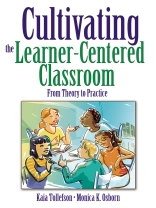‘A superb book that does exactly what it promises: takes the reader from theory to practice. Rich with clear prose, strong research, and thoughtful reflection, this useful tool is for teachers who want to engage students more deeply with each other, the content, and the world—all for the sake of real learning.’
—Parker J. Palmer
Author, The Courage to Teach
Facilitate the growth of successful learning communities—both in the classroom and schoolwide!
Teachers at every level face the challenge of finding a balance between learner-centered philosophies and day-to-day classroom life. Aligned with progressive educational thought, this book shows teachers how to make the jump from theory to practice and cultivate learning communities in the classroom and in their schools.
The authors help both new and experienced educators engage in a fundamental shift in their teaching approach: from behaviorism to constructivism; from following recipes to understanding the learning process; from standardized, age-based expectations to using standards for individualizing expectations and instruction; and from coercing obedience to facilitating students′ authority and autonomy. Readers will find examples illustrating learner-centered strategies in action, information about how to work more effectively with students with special needs, and methods for:
- Organizing the classroom
- Planning instruction for individuals, small groups, or an entire class
- Building students′ responsibility for their own learning
- Observing, assessing, and reporting student growth
Practical and accessible, Cultivating the Learner-Centered Classroom is an essential companion for teachers who want to empower and motivate students for lifelong learning.
Tabela de Conteúdo
Preface
Time to Learn
Fighting for Hope
Acknowledgments
About the Authors
Introduction: Progressivism and Traditionalism—A Continuum of Educational Thought
1. Facilitating Community Development in the Classroom
The Teacher’s Essential Attributes: Confidence and Humility, Compassion and Faith
The Basis of the Teacher-Student Relationship: Motivation or Coercion?
Who Decides Who Belongs? A Note on Inclusive Education
From Theory to Practice: Strategies for Facilitating Relationship and Community
2. Classroom Organization
Finding You in Your Classroom
From Theory to Practice: Strategies for Organizing a Learner-Centered Classroom
3. Observing and Assessing What Students Know and Can Do
Understanding Terminology
Assumption #1: You Can’t Teach Someone You Don’t Know
Assumption #2: You Will Assess What You Value
Assumption #3: You Will Never Finish Learning How to Assess Students’ Knowledge
From Theory to Practice: Strategies for Assessing What Students Know and Can Do
4. Planning Instruction
From Theory to Practice: Strategies for Planning Instruction
5. Evaluating and Reporting Student Growth
Common Assumptions About Grades
A Brief History of Grading
Evaluation as Grading: Critiquing Traditional Purposes of Letter Grades
Learner-Centered Evaluation: Reframing the Purpose of Grading
From Theory to Practice: Strategies for Evaluating and Reporting Student Progress
6. Facilitating Community Development With Parents
From Theory to Practice: Strategies for Facilitating Community Development With Parents
7. Holding On: Leading With Heart
On Becoming a “Real” Leader
Democratic Faith: The Final, Essential Component of Leadership
From Theory to Practice: Strategies for Holding On and Leading With Heart
References
Index
Sobre o autor
Monica Osborn has been teaching at Puesta del Sol Elementary School in Rio Rancho, New Mexico, since 1994. She earned her bachelor′s and master′s degrees in education from the University of New Mexico in 1994 and 1995, respectively, and an education specialist degree in educational leadership in 2007. She is a certified Reading Recovery teacher, currently teaching grades K–2 in a multiage inclusion classroom. She is also certified through the National Board for Professional Teaching Standards and is recognized as a Level III teacher-leader in the state of New Mexico. In addition to her work as a classroom teacher, Monica serves as an educational consultant with the New Mexico Education Network Center and with the National School Reform Faculty, specializing in facilitating the implementation of Critical Friends Groups (CFGs), professional learning communities for educators. She is a CFG coach at her school and has been teaching the process to teachers and administrators in several regions of the United States for the past eight years.












